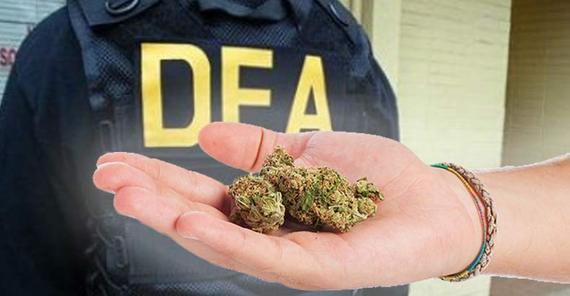Study: Illegal cannabis seizures have ‘decreased dramatically’ amid rise of state-legalization

According to a study conducted by a leading cannabis surveyor for the federal U.S. government, state-level legalization has further dented the Drug Enforcement Administration’s (DEA) opportunities to obtain investigation-worthy illicit cannabis.
Mahmoud ElSohly was the author of the study. He is also the operator of the nation’s standalone federally-approved cannabis grow facility at the University of Mississippi.
“The number of samples received over the last 5-6 years has decreased dramatically owing to the legalization of [cannabis] for either medical or recreational purposes in many U.S. states,” reads an excerpt from the study’s findings.
Currently, ElSohly’s University-housed cannabis cultivation space is the only place that has been sanctioned by the federal government to grow research-grade cannabis.
Due to a lack of available space in which cannabis plants can be yielded for research purposes, lobbyists, lawmakers and scientists have continuously grumbled about lingering restrictions on plant-focused research. Why? Because government-grown cannabis contains reduced cannabinoid levels, as opposed to legal dispensary-sold products.
Fortunately, the DEA announced in May that it is in the process of approving new manufacturers who will be able to produce cannabis that scientists can lawfully research. Moreover, the governmental agency has suggested bolstering cannabis and psilocybin production for research purposes.
Consumer demand from illicit avenues is reducing in the midst of cannabis reform
One of the key takeaways from ElSohly’s study into cannabis seizures is that consumer demand from illegal avenues is plummeting amid growing acceptance of the plant. This discovery supports the claim that pro-cannabis lobbyists are renowned for making — consumer demand for black market-sold cannabis is likely to shrink as more legal avenues transpire.
Published at the beginning of 2021 in the journal Biological Psychiatry, the study noted how illicit cannabis seizures have “precipitously declined over time, starting in the year 2011 (>2342 exhibits) to 2019 (<100 exhibits).”
The study authors attribute this reduction in illicit cannabis seizures to the fact that cannabis legalization – be it for medical or recreational purposes – is being adopted on a broader scale across much of the U.S. Consequently, the DEA’s enforcement efforts have been starved.
“These results are in agreement with other potency monitoring programs in several European countries,” the study authors continued. “There appears to be a recent trend of the inclusion of higher CBD levels containing chemovars in illicit cannabis.”
FBI data indicates reduction in cannabis-related crimes, arrests and prosecutions
The drop in illicit cannabis seizures coincides with dwindling rates of cannabis arrests. In fact, fresh FBI data indicates that cannabis-related arrests have sunk countrywide, with the most noticeable drop in such incidents occurring last year.
An analysis from the U.S. Sentencing Commission (USSC) shows that cases of federal cannabis trafficking also decreased in 2020 — something that can be attributed to the rising number of states enacting legalization. This analysis was published in June 2020.
Moreover, a report issued by Supreme Court Chief Justice John Roberts last year also highlighted how federal arrests for drug-related crimes surged in 2019. Conversely, events involving cannabis nosedived by more than a quarter; thus demonstrating the benefits of legalization.
Aside from ElSohly’s insights into illicit cannabis seizures and black market demand, his study also demonstrated how the THC potency of DEA-seized illicit cannabis samples has risen over time.







